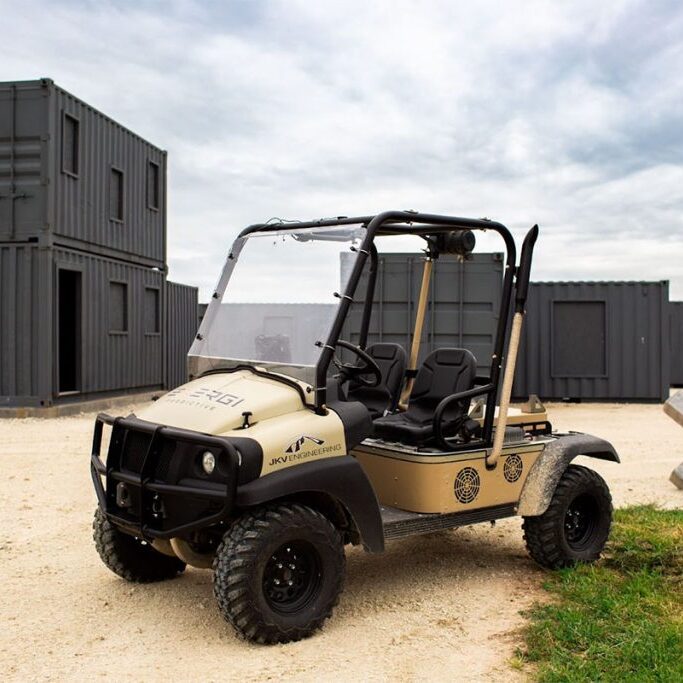
Exergi Teams with JKV Engineering to Develop Range Extended Utility Vehicle
Exergi Predictive, a small business based in St. Paul, MN, has joined forces with JKV Engineering, a mechanical engineering firm based in Cincinnati, OH, to develop a range-extended electric utility vehicle.
The vehicle was recently demonstrated at the George H.W. Bush Combat Development Complex in College Station, TX, as part of the Army Application Laboratory (AAL) SBIR Phase II mid-point demonstration. The development of this vehicle is a significant achievement because it provides a unique platform for testing and demonstrating Exergi’s energy management software.
The range-extended electric utility vehicle was developed to mirror future powertrains being considered for a range of military ground platforms including the Robotic Combat Vehicle (RCV). Often, electric-only powertrains are not sufficient for the wide range of duty cycle seen in military use cases. The range-extended electric utility vehicle is powered by an all electric drive system that incorporates a small internal combustion engine as a generator. This allows the vehicle to operate using electric power alone for short distances, but also provides the range extension necessary for longer missions. The vehicle also features advanced physics-guided AI software provided by Exergi that predicts energy usage and reduces fuel consumption.
The initial demonstration of the range-extended utility vehicle at the George H.W. Bush Combat Development Complex was a major success, exceeding expectations in terms of utility, range, and durability. The vehicle was well-received by representatives from both the military and private sector during the AAL demonstration, who recognized its potential applications including base operations and as a light personnel carrier.
The development of the range-extended utility vehicle represents a significant achievement for both Exergi Predictive and JKV Engineering. Both companies brought unique expertise and capabilities to the project. The vehicle was designed and delivered in less than a year, and now serves as Exergi’s primary platform for testing its energy management software.
Exergi Predictive specializes in the development of predictive energy software for vehicles. The software is designed to reduce range anxiety, increase mission success rate, and save energy in off-road vehicles. The software uses physics-guided machine learning algorithms to analyze past vehicle data and make energy use predictions before and during a trip. A custom user interface allows users to easily monitor and control vehicle battery and fuel levels in real-time, providing them with the information they need to make informed decisions.
JKV Engineering specializes in the design and development of complex electro-mechanical systems. Their expertise was critical in the development of the hybrid electric system used in the range-extended utility vehicle.
Moving forward, the range-extended utility vehicle will be an essential development tool for the two companies. It also could be a stand-alone product offering as a sustainable solution to diesel-only utility vehicles. Its range extended electric system, combined with Exergi’s advanced predictive analytics technology, offers a unique solution to the challenges of energy efficiency and range extension. The technology developed for the range-extended utility vehicle has the potential to be applied in a variety of dual use applications, from military ground vehicles to commercial delivery trucks..
As the demand for sustainable transportation solutions continues to grow, companies like Exergi Predictive and JKV Engineering are leading the way in the development of innovative technologies. By combining expertise and capabilities, these companies are able to develop sustainable and efficient transportation solutions that meet the unique needs of a variety of dual use applications. The development of the range-extended utility vehicle is just one example of the potential that exists for new joint projects for the two teams in the electric vehicle industry.